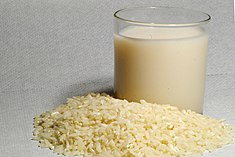– History:
– Origin of rice milk uncertain
– Recipe in 1914 by Maria M. Gilbert
– First rice milk factory in 1921
– Rice Dream launched in 1990
– Popular rice milk brands’ history
– Nutrition:
– Rice milk composition
– Nutrient content per 100ml
– Daily Value (DV) for vitamin B12
– Fortification with vitamins and minerals
– Comparison to other plant milks
– Safety in young children:
– UK Food Standards Agency recommendation
– Arsenic levels in rice milk
– Not recommended for children under 5
– Alternatives for young children
– Risks associated with arsenic
– Comparison to dairy milk:
– Nutritional differences
– Fortification of commercial rice milk
– Glycemic index comparison
– Suitable for lactose intolerant individuals
– Common use by vegans
– Commercial brands:
– Variety of flavors available
– Usage in recipes
– Availability of unflavored options
– Substituting traditional cow milk
– Consumer preferences and trends
Rice milk is a plant milk made from rice. Commercial rice milk is typically manufactured using brown rice and brown rice syrup, and may be sweetened using sugar or sugar substitutes, and flavored by common ingredients, such as vanilla. It is commonly fortified with protein and micronutrients, such as vitamin B12, calcium, iron, or vitamin D.
 | |
| Nutritional value per 100 g (3.5 oz) | |
|---|---|
| Energy | 195 kJ (47 kcal) |
9.2 g | |
| Sugars | 5.3 g |
| Dietary fiber | 0.3 g |
1.0 g | |
0.3 g | |
| Vitamins | Quantity %DV† |
| Thiamine (B1) | 3% 0.03 mg |
| Riboflavin (B2) | 1% 0.014 mg |
| Niacin (B3) | 3% 0.4 mg |
| Pantothenic acid (B5) | 3% 0.15 mg |
| Vitamin B6 | 2% 0.04 mg |
| Folate (B9) | 1% 2 μg |
| Vitamin B12 | 26% 0.63 μg |
| Vitamin C | 0% 0 mg |
| Vitamin D | 5% 1 μg |
| Vitamin E | 3% 0.47 mg |
| Vitamin K | 0% 0.2 μg |
| Minerals | Quantity %DV† |
| Calcium | 9% 118 mg |
| Copper | 4% 0.04 mg |
| Iron | 1% 0.2 mg |
| Magnesium | 3% 11 mg |
| Manganese | 12% 0.28 mg |
| Phosphorus | 4% 56 mg |
| Potassium | 1% 27 mg |
| Sodium | 2% 39 mg |
| Zinc | 1% 0.13 mg |
| Other constituents | Quantity |
| Water | 89.3 g |
| †Percentages estimated using US recommendations for adults, except for potassium, which is estimated based on expert recommendation from the National Academies. | |
